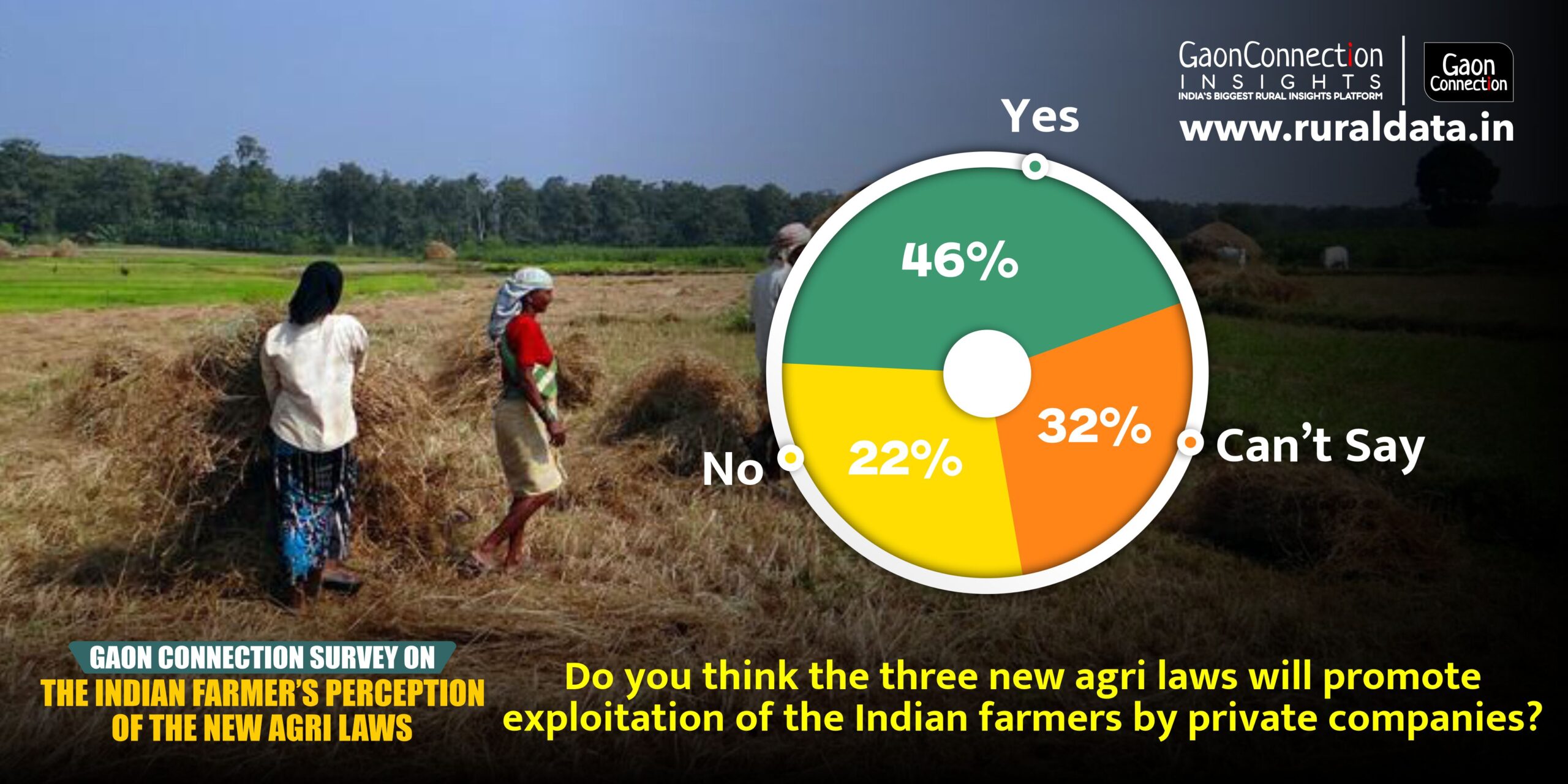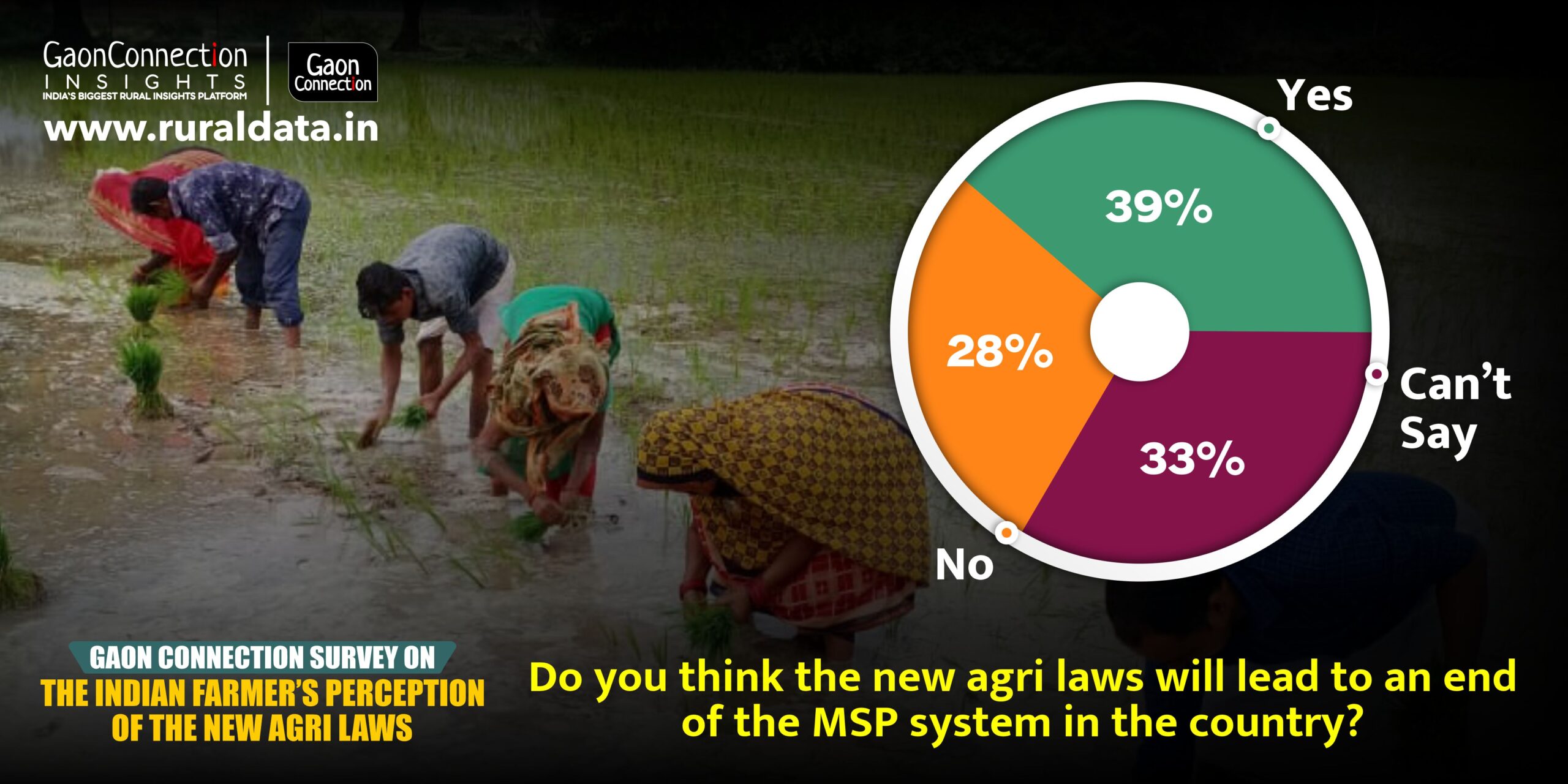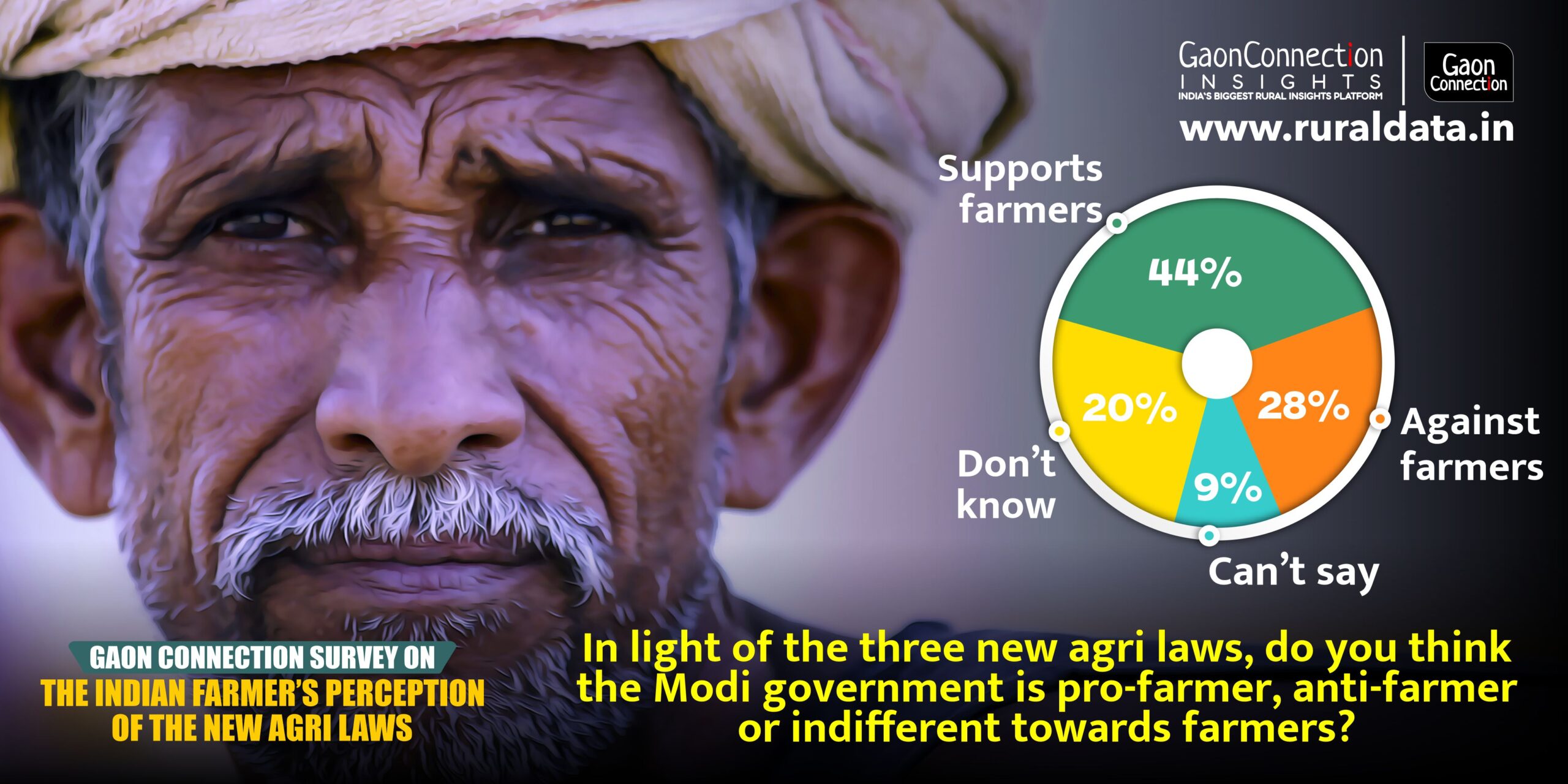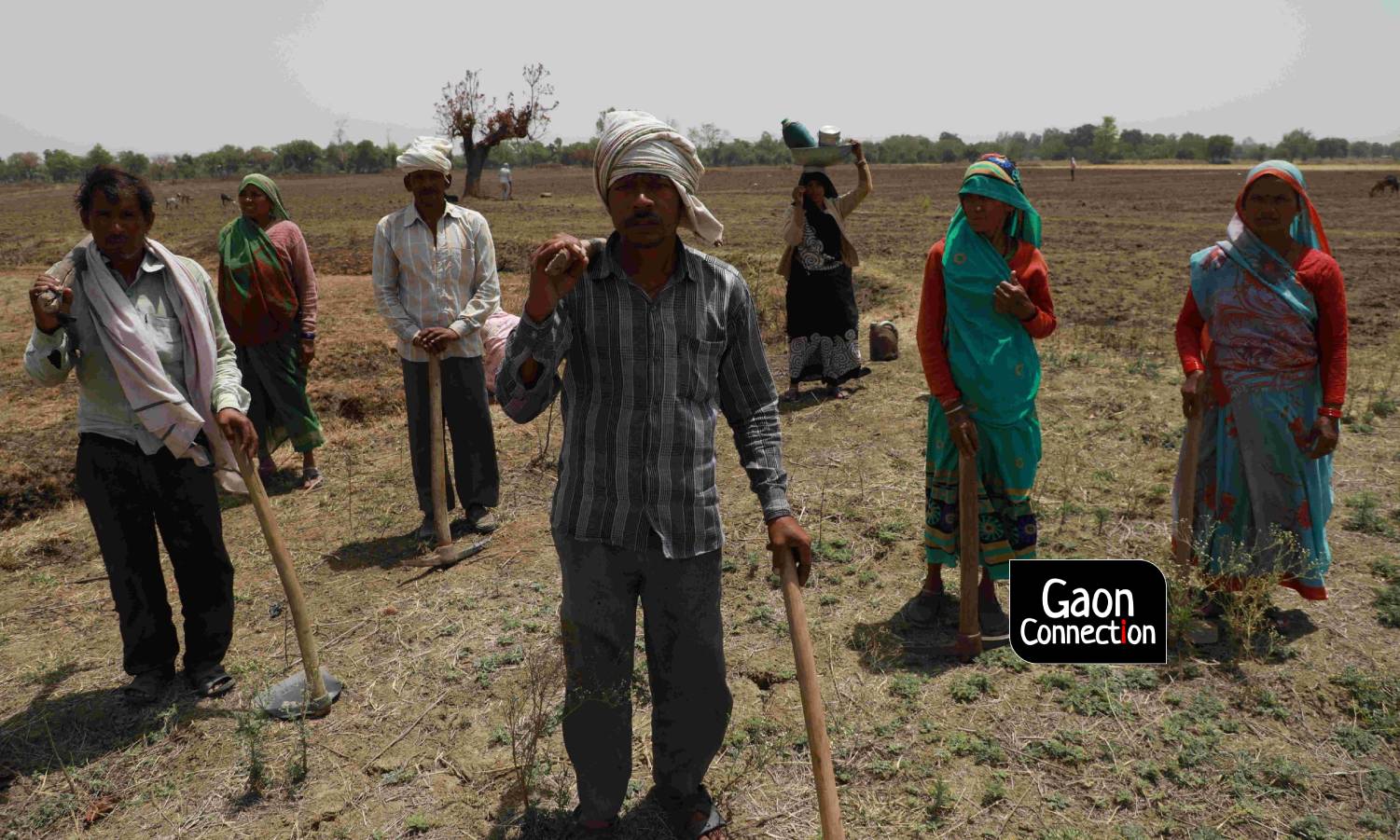According to the central government, the three new agricultural bills passed during the last monsoon session of Parliament, will improve the income of farmers in the country. But as much as 46 per cent of farmers feel these laws will only result in exploitation at the hands of private players and multinational companies, as reflected in the recent rapid survey conducted by Gaon Connection in 53 districts of 16 states in India.
The Indian government has said the open market will increase competition, encourage private investment, help develop infrastructure and benefit farmers by increasing employment opportunities and farmers’ incomes. But farmers’ organisations allege these laws are but a conspiracy to benefit big companies in the long run.
A large section also fears the laws promoting open market, contract farming and withdrawal of stock-limit in essential commodities would increase black marketing and stockpiling and only benefit traders, not farmers.
The Gaon Connection survey found that two-thirds (67 per cent) of the respondent farmers were aware of the three new agricultural laws and were also aware of the farmers protesting these laws. Upon asking the reason for their opposition or support to the agricultural laws, as much as 57 per cent of those opposing the laws said it was because they would have to sell their produce at a lower price in the open market, while 38 per cent felt the new agri bills would increase farmers’ dependence on private companies.

Among the respondents, 36 per cent feared that due to the open market, the government would decrease procurement at minimum support price (MSP) while 33 per cent of farmers feared that the MSP system would be eliminated by the new laws. As much as 32 per cent of the respondents opposed the bill over fears that the law relating to contract farming would make the farmer a bonded labourer in his own field. Another 20 per cent of farmers believed the new law would increase hoarding and black marketing.
Along with other survey findings, farmers’ fear of corporates is highlighted in Gaon Connection’s recently released ‘The Rural Report 2: The Indian Farmer’s Perception of the New Agri Laws’. The three new agri laws include The Farmers’ Produce Trade and Commerce (Promotion and Facilitation) Act, 2020 seeks to give freedom to farmers to sell their produce outside of the notified APMC market yards.
The Farmers (Empowerment and Protection) Agreement of Price Assurance and Farm Services Act, 2020, gives farmers the right to enter into a contract with agribusiness firms, processors, wholesalers, exporters or large retailers for the sale of future farming produce at a pre-agreed price.
The Essential Commodities (Amendment) Act, 2020, is meant to remove commodities such as cereals, pulses, oilseeds, onion and potato from the list of essential commodities and do away with the imposition of stock holding limits.
Devinder Sharma, food and export policy expert, told Gaon Connection that farmers are afraid of corporates, because they’ve already burnt their fingers in the past with contract farming. “Farmers’ experiences with Walmart with regard to cultivation of potatoes, tomatoes and baby corn have not been good,” he said. He advocates the provision of facilities to farming entrepreneurs at par with those extended to any corporate.
However, the three new laws of the government are all about encouraging private investment in the field of agriculture. Speaking at a function after the new agri bills was passed by Parliament, union agriculture and farmers welfare minister Narendra Singh Tomar said removing items from the essential commodities list would increase private investment, and big companies buying more would create infrastructure to store the produce and provide employment.

Farmers’ organisations wonder if the investment and welfare of farmers was the intention, why did the government not invest, because corporates would also seek profit. “Traditional farmers who belong to a union or a party will react differently to the laws than an educated farmer, but the inhibition will persist. They see what has happened with entities like BSNL and Air India. They see that the railways are being privatised, that airports are being operated by private players. Naturally, they have apprehensions regarding APMC [Agricultural Produce Market Committee] , MSP [minimum support price] and contract farming,” said Mohit Mangi, a research scholar from Maharishi Dayanand University, Rohtak, who is researching government procurement in Rohtak, Haryana.
Perception of the government
Meanwhile, as part of the rapid survey, Gaon Connection also asked the farmers their opinion about the Narendra Modi government at the Centre, and their respective state governments. Almost 35 per cent felt the Modi-led government supported farmers, while 43.8 per cent said the government favoured middlemen, businessmen and private companies.
During the survey, farmers were also asked whether they believed the Modi government to be pro- or anti-farmer, in view of the new laws. In the four options provided, 44 per cent felt the government is pro-farmer, 28 per cent called it anti-farmer, 19 per cent did not know while 9 per cent declined to answer.
These survey figures show that a section of farmers trusts the Modi government, but is wary about corporates. On being asked what farmers thought was the most pro-farmer step of the Modi government, the highest percentage of 32 per cent respondents said it was the PM Kisan Nidhi scheme followed by the Fasal Bima Yojana (21 per cent).

The government claims that through new laws (reforms), farmers’ incomes will grow rapidly. The Modi government has consistently talked about doubling the income of farmers by 2022. As per the Gaon Connection rapid survey, just 36 per cent of farmers believed the new agri laws would improve the agricultural system in the country and only 29 per cent thought the new laws would help double the income of farmers by 2022.
“Agricultural laws need a lot of research. Their reforms need to be properly analysed on the ground because the government had not consulted with state governments and farmer-welfare institutions before implementing them,” said Mangi.
Farmers’ organisations and the opposition question the agricultural laws in view of the new bills passed in the Punjab assembly, complaints coming from several states regarding procurement of paddy despite farmer protests and the skyrocketing prices of onion. “The politician must keep aside his politics and think like a farmer on this issue. We don’t know how much farmers will benefit from what happened in Punjab, but the debate has been sparked all over the country and will surely bring some change in the lives of farmers,” concluded Sharma.



















